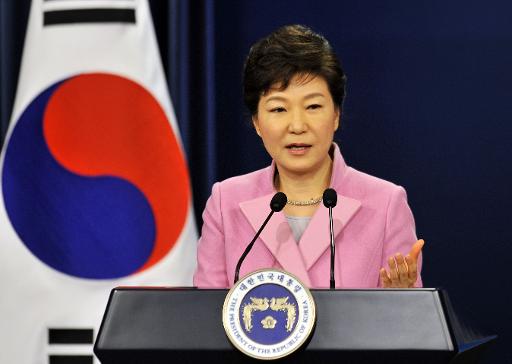SEOUL – South Korean President Park Geun-Hye on Monday proposed fresh reunions of families separated by the Korean War after a previous bid was cancelled by Pyongyang, and promised increased humanitarian aid to the North.
In her New Year press conference, Park also said the shock purge and execution last month of Jang Song-Thaek, the once-powerful uncle and political regent to young leader Kim Jong-Un, raised uncertainties over the stability of the state.
North Korea in September last year cancelled a scheduled reunion of families divided by the war, dealing an emotional blow to elderly Koreans denied a longed-for, and probably final, meeting with surviving relatives.
After a painstaking selection process, 96 South Koreans had been set to travel to the North's Mount Kumgang resort for a face-to-face gathering with family members they haven't seen for 60 years.
It would have been the first such mass reunion for three years, but with just days to go, Pyongyang postponed the event, blaming "hostility" from South Korea.
At the time, South Koreans described their heartbreak at the decision. Kang Neung-Hwan, 92, who had desperately hoped to see his son, who lives in the North, told Yonhap news agency: "I am greatly disappointed. It's increasingly painful for me to wait to see my son."
"I hope that elderly members of separated families will be allowed to reunite around Lunar New Year (on January 31) to help heal the wounds in their hearts," Park said in her address.
She said the South would increase humanitarian aid and expand exchanges with the North this year. Seoul last year offered 13.5 billion won ($12.7 million) in aid for the North Korean operations of international organisations like UNICEF. The South does not currently offer direct aid to the North.
Park urged the Pyongyang to provide a new momentum to improving inter-Korean ties through such reunions.
Sporadic reunions of separated families began to be arranged in earnest following a historic inter-Korean summit in 2000 and an estimated 17,000 people have been reunited since then.
But the gatherings were suspended again in 2010 following the North's shelling of a South Korean border island.
In the last year, the North has staged a series of provocative actions, including a third nuclear test, threats of military attacks and the unilateral closure of an inter-Korean industrial zone.
Park said the security situation on the Korean peninsula was "more grave than ever".
She called for an end to "threats of war" and for the two countries to "open up an era of reunification".
"The recent execution of Jang Song-Thaek has made it harder to predict (what would happen to relations between the South and the North)," Park said.
"No one in the world can predict what might happen to North Korea and what action it might take," Park said.
"We are making preparations for all kinds of possibilities."
The two Koreas are still technically at war as the Korean War ended in an armistice instead of a peace treaty in 1953.
"Next year will mark 70 years since the national division," Park said.
"We must free ourselves from confrontation, threats of a war and nuclear blackmails and open up an era of reunification. We should make preparations for it."




















































